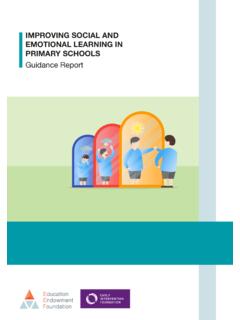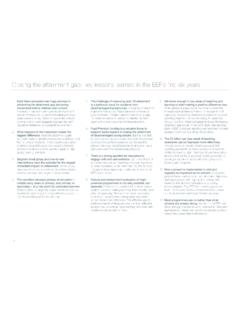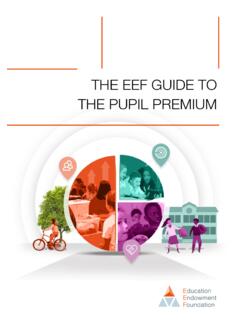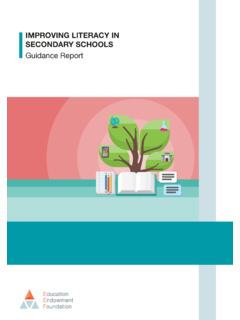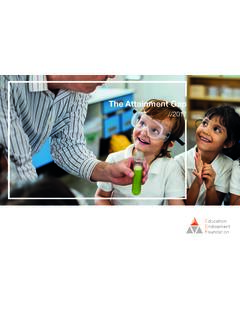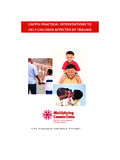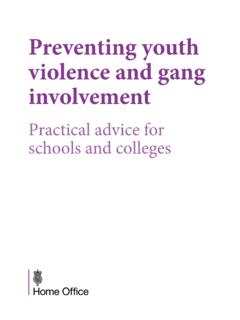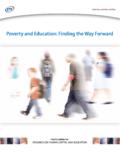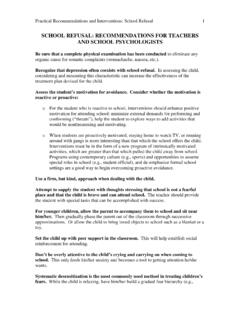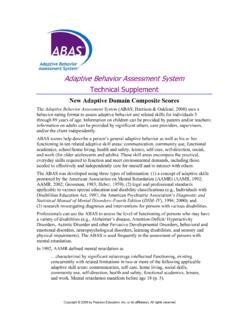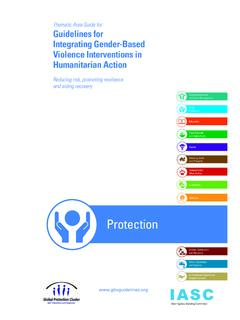Transcription of WORKING WITH PARENTS TO SUPPORT CHILDREN’S …
1 Guidance ReportWORKING WITH PARENTS TO SUPPORT children S LEARNING We would like to thank the many researchers and practitioners who provided SUPPORT and feedback on drafts of this guidance. In particular we would like to thank the Advisory Panel and Evidence Review Team:Advisory Panel: Laura Barbour (Sutton Trust), Professor Tracey Bywater (University of York), Janet Davies (Parental Engagement Network), Fiona Jelley (University of Oxford), Dr Janet Goodall (University of Bath), Dr Julian Grenier (Sheringham Nursery School), Stuart Mathers (EEF), Professor Kathy Sylva (University of Oxford), and Chris Woodcock (Durrington Research School, part of DMAT).Evidence Review Team: Dr Nick Axford (University of Plymouth), Dr Vashti Berry (University of Exeter), Dr Jenny Lloyd (University of Exeter), Dr Darren Moore (University of Exeter), Morwenna Rogers (University of Exeter), Alison Hurst (University of Exeter), Kelly Blockley (University of Plymouth), Hannah Durkin (University of Exeter), and Jacqueline Minton (University of Exeter).
2 Peer reviewers: Professor Steve Higgins (University of Durham) and Professor Pam Sammons (University of Oxford).Guidance report authors: Matthew van Poortvliet (EEF), Dr Nick Axford (University of Plymouth), and Dr Jenny Lloyd (University of Exeter).Acknowledgement: The time of Nick Axford is supported by the National Institute for Health Research (NIHR) Collaboration for Leadership in Applied Health Research and Care South West Peninsula. The views expressed are those of the authors and not necessarily those of the NHS, the NIHR, or the Department of Health and Social Endowment Foundation 33 Parental engagement in children s learningForeword 4 Introduction 5 Summary of recommendations 6 Recommendation 1 Critically review how you work with parents9 Recommendation 2 Provide practical strategies to SUPPORT learning at home13 Recommendation 3 Tailor school communications to encourage positive dialogue about learning19 Recommendation 4 Offer more sustained and intensive
3 SUPPORT where needed25 References 30 How was this guidance compiled? 34 CONTENTSAsk any teacher why they got into teaching and almost all will give you the same answer: to give young people, whatever their background and wherever they come from, the best possible start in life. This mission unites teachers. Yet despite our best efforts, the poorest students are still much less likely than their classmates to leave school with the qualifications they much of this battle can be won inside the school gate, what happens at home is crucial too. We know that levels of parental engagement are consistently associated with children s academic outcomes. We also know that a parent s job, education and income matters less to their child s development than what they actually do with and PARENTS have a shared interest in doing the best for their children . However, it is sometimes difficult to know where to start.
4 Some PARENTS feel anxious about reading to their children , particularly if they struggle with their own literacy skills. Others worry that they can t afford the same sort of books or trips out that other families can. Schools also do not always know how they can work with families most is why we ve produced this guidance report. It offers primary and secondary schools four practical and evidence-based recommendations on WORKING with PARENTS so that they can SUPPORT their child s learning at arrive at the recommendations, we reviewed the best available international research and consulted with teachers and other experts. The evidence in this area is not yet as strong as we would like, so an over-arching recommendation focuses on the importance of planning and monitoring your school s parental engagement activities to get the most out of them. Other recommendations look at the best ways to communicate with PARENTS , and strategies for supporting learning at with all our guidance reports, the publication is just the start.
5 We will now be WORKING with the sector, including through our colleagues in the Research Schools Network, to build on the recommendations with further training, resources and guidance. And, as ever, we will be looking to SUPPORT and test the most promising programmes that put the lessons from the research into practice. Sir Kevan CollinsChief ExecutiveEducation Endowment Foundation4 Education Endowment Foundation FOREWORD5 INTRODUCTIONWhat does this guidance cover?This guidance report aims to help schools considering how they can work with PARENTS and carers to improve children s learning.* Schools work with PARENTS and families in many ways and with a range of aims, for example, to involve PARENTS in school decision-making, to be proactive about safeguarding, and to engender relationships of trust and respect between school and home. In this report, we focus mostly on activities that aim to improve children s learning directly. So, when we refer to parental engagement we mean schools WORKING with PARENTS to improve children s academic outcomes.
6 This guidance report draws on a recent review of the evidence about parental engagement in children s learning funded by the Education Endowment Foundation (EEF). It is not a new study in itself, but rather is intended as an accessible overview of existing research with clear, actionable guidance. The guidance also draws on a wider body of evidence and expert to other areas in which the EEF has produced guidance to date, for example related to literacy, there is, as yet, less rigorous evidence for what constitutes effective parental engagement in children s learning, so an over-arching message for schools is to plan and monitor their work in this area carefully. In addition to the evidence review, the EEF commissioned a survey of what schools in England are currently doing to engage PARENTS in children s learning. This information is used to provide context for the recommendations, and to identify where there are gaps between current practice and the evidence.
7 More information about the review and how it was produced is provided at the end of this guidance report. Some key references are included for those wishing to explore the subject in more depth. The full evidence review and research on current practices that underpin this guidance will be published separately, and will contain a more comprehensive reference is this guidance for?This guidance is applicable to both primary and secondary schools. It is aimed primarily at senior leaders who are thinking about their school s approach to engaging PARENTS . It may also be useful for class teachers. Further audiences who may find the guidance relevant include governors, PARENTS , programme developers, family SUPPORT workers, and educational on the guidance Additional EEF resources to SUPPORT the implementation of the recommendations made in this report will be developed. As well as these resources, the EEF s other subject-specific guidance reports can SUPPORT the implementation of specific recommendations.
8 For example, those on literacy, maths, and science can be used in conjunction with this report to SUPPORT pupils attainment in these subjects. The EEF s more general guidance, such as Putting Evidence to Work A School s Guide to Implementation, can also SUPPORT teachers and senior staff to apply the recommendations in a practical way in their own may also want to seek SUPPORT from our national network of Research Schools, a collaboration between the EEF, the Institute for Effective Education, and the Department for Education. Research Schools aim to lead the way in the use of evidence-based teaching, building affiliations with large numbers of schools in their region, and supporting the use of evidence at engagement in children s learning* Throughout this report, wherever we refer to PARENTS we mean PARENTS and carers , including for example grandparents and older siblings when they have significant caring responsibilities for review how you work with parents6 Education Endowment Foundation SUMMARY OF RECOMMENDATIONS For young children , promoting shared book reading should be a central component of any parental engagement approach.
9 Home learning activities, such as playing with letters and numbers, are also linked to improved outcomes. Tips, SUPPORT , and resources can make home activities more effective for example, where they prompt longer and more frequent conversations during book reading. Book-gifting alone is unlikely to be effective, but carefully selected books plus advice and SUPPORT can be beneficial for supporting reading. SUPPORT PARENTS to create a regular routine and encourage good homework habits, but be cautious about promoting direct parental assistance with homework (particularly for older children ). PARENTS can SUPPORT their children by encouraging them to set goals, plan, and manage their time, effort, and emotions. This type of SUPPORT can help children to regulate their own learning and will often be more valuable than direct help with homework tasks. Consider initiatives to encourage summer reading; these have some promise but are not widely used at present.
10 Page 13 Provide practical strategies to SUPPORT learning at home2 Schools should be optimistic about the potential of WORKING with PARENTS There is an established link between the home learning environment at all ages and children s performance at school. Schools and PARENTS have a shared priority to deliver the best outcomes for their , evidence on effective strategies that schools can use to engage PARENTS in their children s learning is mixed If the aim is solely to improve academic outcomes, classroom interventions WORKING directly with children currently have more evidence of effectiveness at improving learning than parenting interventions with the same aim. WORKING effectively with PARENTS can be challenging, and is likely to require sustained effort and SUPPORT . Most schools say that they do not have an explicit plan for how they work with PARENTS , and fewer than 10% of teachers have undertaken CPD on parental should start by critically reviewing their aims and current approaches Focus on areas that have better evidence (such as those summarised opposite) different approaches are needed for different ages.
